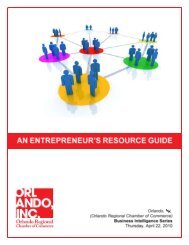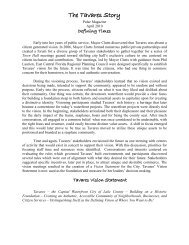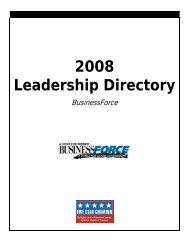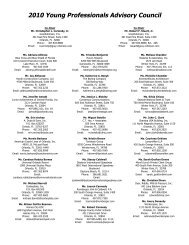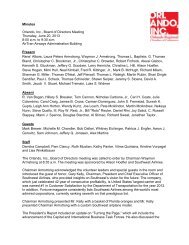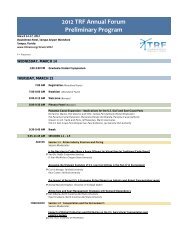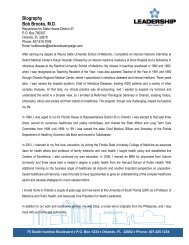FM Oct 04 PDF - Orlando Chamber of Commerce
FM Oct 04 PDF - Orlando Chamber of Commerce
FM Oct 04 PDF - Orlando Chamber of Commerce
You also want an ePaper? Increase the reach of your titles
YUMPU automatically turns print PDFs into web optimized ePapers that Google loves.
Identity<br />
Theft<br />
Organizations take<br />
measures to protect<br />
employees.<br />
From the Society for Human Resource<br />
Management<br />
The Society for Human Resource<br />
Management (SHRM) recently<br />
conducted an online survey that<br />
measures organizations efforts to<br />
guard employees against identity<br />
theft. Fifty-four percent <strong>of</strong> the human<br />
resource (HR) pr<strong>of</strong>essionals surveyed<br />
say they have a written privacy policy<br />
safeguarding employee data.<br />
The online survey found that<br />
companies are limiting the use <strong>of</strong> social<br />
security numbers on time sheets,<br />
computer log-ins and forms.<br />
HR pr<strong>of</strong>essionals were asked, “What<br />
measures is your organization taking to<br />
protect employee information and guard<br />
employees against identity theft? (Please<br />
select all that apply)” Forty-nine percent<br />
<strong>of</strong> the HR pr<strong>of</strong>essionals say background<br />
checks are performed on employees<br />
who will have access to employee files.<br />
Other responses included the<br />
following:<br />
■ 95 percent say they lock up employee<br />
files and limit access to them.<br />
■ 54 percent say their organization has<br />
a written privacy policy safeguarding<br />
employee data.<br />
■ 49 percent say they conduct<br />
background checks on employees<br />
who have access to employee files.<br />
■ 24 percent say they educate<br />
employees on fraud prevention.<br />
■ 21 percent say their organization<br />
has a company policy on what<br />
to do in the event employee<br />
information is compromised.<br />
■ 2 percent say their organization<br />
contracts with an outside firm<br />
that helps employees who are<br />
victims <strong>of</strong> identity theft.<br />
The online Identity Survey<br />
responses consisted <strong>of</strong> 419 randomly<br />
selected HR pr<strong>of</strong>essionals.<br />
For more, visit SHRM online at<br />
www.shrm.org.<br />
The Human Relations Doctor<br />
Dr. Mimi Hull is a fully licensed corporate psychologist<br />
whose <strong>Chamber</strong> Member firm, Hull & Associates, specializes<br />
in Human Relations assessment, training, consulting<br />
and facilitation. Below are some questions posed to Dr.<br />
Hull by people in the local business community.<br />
Dear Dr. Mimi,<br />
I recently heard bits and pieces<br />
<strong>of</strong> a conversation on behavioral<br />
interviewing. I was wondering if you<br />
could give me more insight into this<br />
topic and if you think that learning<br />
the technique is worthwhile.<br />
Dear Just,<br />
— Just Wondering<br />
We <strong>of</strong>ten train our clients to do<br />
behavioral interviewing as it focuses<br />
on examples <strong>of</strong> past behavior that<br />
can be useful to help predict future<br />
actions and attitudes. The benefit <strong>of</strong><br />
using this method is that you’re able<br />
to get the person to tell you more<br />
about specific experiences and<br />
anything they may have learned from<br />
those experiences.<br />
In a traditional interview, by<br />
simply asking if they like to work hard,<br />
you may only get a yes or no answer.<br />
This interviewing method will give<br />
you more information to go on when<br />
deciding if the person is right for your<br />
particular job.<br />
Here are a couple <strong>of</strong> samples <strong>of</strong><br />
some traditional interview questions<br />
and the behavioral interviewing<br />
questions developed from these:<br />
■ Traditional —<br />
Do you like to work hard?<br />
Behavioral —<br />
Tell me about a time in which you<br />
had to be persistent in order to<br />
reach one <strong>of</strong> your goals.<br />
■ Traditional —<br />
Are you good at making decisions?<br />
Behavioral —<br />
Describe a situation in which you had<br />
to draw a conclusion quickly and take<br />
immediate action.<br />
Not all questions in an interview<br />
need to be behavioral. Tailor your<br />
questions to get the information<br />
that you need to determine if the<br />
candidate is right for your particular<br />
position.<br />
Dear Dr. Mimi,<br />
I have an employee who I am<br />
certain has brilliant ideas, but she is<br />
very shy and introverted. We are<br />
about to have an important strategic<br />
planning session, and I would love to<br />
have her express her ideas, but I fear<br />
that she won’t say a word. How can<br />
I coax her to speak up?<br />
Dear Extrovert,<br />
— Extrovert<br />
Let me explain the difference<br />
between introverts, extroverts and shy<br />
people. Introverts do not fear social<br />
situations, but prefer solitary activities.<br />
Extroverts love social situations and<br />
speak up freely. People who are shy<br />
are not introverts. They would like to<br />
socialize but are <strong>of</strong>ten restrained by<br />
inner fears. Perhaps your employee is<br />
afraid <strong>of</strong> what others will think <strong>of</strong> her<br />
ideas, so she is hesitant to express herself.<br />
You may want to talk with her<br />
ahead <strong>of</strong> time to learn if she is truly<br />
shy or simply an introvert.<br />
Below are some tips to help her<br />
feel more at ease:<br />
■ Build a safe climate — If she is<br />
indeed shy, do not allow anyone to<br />
criticize ideas or tease within the<br />
strategic planning setting. What may<br />
seem like benign teasing can be a<br />
thought stopper.<br />
■ Use an outside facilitator — One <strong>of</strong><br />
the best ways to build a safe environment<br />
is to use an outside facilitator.<br />
The outside facilitator is invaluable<br />
both before and throughout the<br />
strategic planning session. We’ve<br />
<strong>of</strong>ten found that people are reluctant<br />
to share ideas with their boss<br />
especially if their boss is doing the<br />
facilitating. As a neutral facilitator<br />
we conduct interviews, focus groups<br />
and/or surveys prior to meetings and<br />
learn many things that employees<br />
would never tell their boss.<br />
■ Create an equal-opportunity<br />
environment — If meetings are<br />
dominated by extroverts shouting out<br />
ideas, this intimidates shy people. You<br />
may want to institute a rule that no<br />
one speaks twice until everyone has<br />
an opportunity to speak at least once.<br />
■ Permit silent participation —<br />
People process information differently,<br />
and while they may not speak up<br />
they are still participating by listening.<br />
■ Use alternative methods — Give<br />
everyone an alternative way to submit<br />
their ideas before, during or after the<br />
meeting. This can be in writing or<br />
electronic form. You may want to<br />
allow people to make anonymous<br />
recommendations.<br />
■ Announce when brainstorming<br />
is just about over — Quiet thinkers<br />
will <strong>of</strong>ten wait to contribute their<br />
ideas until brainstorming is just<br />
about over instead <strong>of</strong> participating<br />
in an ongoing discussion.<br />
■ Give positive reinforcement — Shy<br />
people are very critical <strong>of</strong> themselves<br />
and their mistakes. When they give an<br />
idea, be sure to encourage it and ask<br />
others to build on it.<br />
■ Allow small-group collaboration<br />
— People who are shy <strong>of</strong>ten do not<br />
open up to everyone. Break the larger<br />
group into pairs or triad and have the<br />
small groups share and then report<br />
out their ideas.<br />
If you’re having a problem with a<br />
personality dispute, or a hard-to-handle<br />
group, or just want to get your<br />
employees to work better together, you<br />
can either phone or e-mail Dr. Hull at<br />
407-628-0669 or mimi@hullonline.com.<br />
<strong>FM</strong> OCTOBER 20<strong>04</strong> 7



